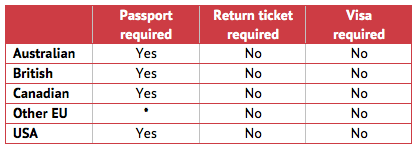Vasco da Gama, Bartolomeu Dias, Pedro Álvares Cabral – The Portuguese Explorers discovered much of the world hundreds of years ago. But it is about the time for the world to discover Portugal. PortugalStartups.com might be the one to give you a little hint here. We want our readers not only to consider bringing their businesses to this land, but to be aware of all the traps & threats before doing so.
To enter a new market, one must know the local ecosystem with all its aspects. Follow up with the Facts and numbers about Portugal in order to jump right on to the next level – required entry formalities. The question for non-Portuguese people is not whether or not to start a company here. Portugal is ranked 10th in the world where it is easier to start a new business by The World Bank Group. The question is – What is there to be done before moving, living & working in Portugal?
Entry formalities for Portugal
Passports
If coming from one border-free Schengen country, EU nationals are not required to show a national ID card or a passport. One should be carrying a passport or ID card, though, to prove identity if necessary.
(*) One of those is always required from people traveling from Bulgaria, Croatia, Cyprus, Ireland, Romania and the UK, since they are not part of the Schengen area. EU nationals are not required to possess a return ticket or show sufficient funds. In addition to the identity card, minors must present authorisation from their parents to travel.
For a shorter, less than 90 days stay, a passport must be valid for at least three months after the stay for the citizens of the following countries:
Albania, Andorra, Antigua and Barbuda, Argentina, Australia, Bahamas, Barbados, Bosnia-Herzegovina, Brazil, Brunei, Canada, Chile, Costa Rica, Croatia, Guatemala, Holy See, Honduras, Israel, Japan, Macedonia, Malaysia, Mauritius, Mexico, Monaco, Montenegro, New Zealand, Nicaragua, Panama, Paraguay, Saint Kitts and Nevis, San Marino, Serbia, Seychelles, Singapore, South Korea, USA, Uruguay, Venezuela, Special Administrative Regions of the People´s Republic of China in Hong Kong, Macao and Taiwan territorial Authority.
Visas
Citizens from the countries mentioned above do need a Visa to enter Portugal, which may be requested at the Portuguese Embassy or Consulate of their country for the visits up to 90 days or downloaded directly online. Visas for Portugal are not required by all nationals referred to in the chart above. Nationals of Australia, Canada and the USA can stay for up to 90 days without a Visa. EU nationals can stay for an unlimited period, but must register with the local authorities after three months.
Under the terms of the Convention Implementing the Schengen Agreement, flights between Schengen states are considered to be internal flights and passengers do not need to obtain another Visa.
Additional information:
- Costs – Schengen visa: €60; temporary stay visa: €75 (usually issued for study, medical or work purposes).
- Validity – Schengen visa: 90 days within a six-month period; temporary stay Visa: multiple entries within a four-month period.
- How to apply for Visa – Visit the consular section of the nearest Portuguese Embassy in person and check out the Schengen visa info – some embassies (London f.i.) also accept online applications; see www.secomunidades.pt/vistos for further information.
- Working days – Allow up to 15 days for Visa processing. Applications from some nationalities may take up to two months however.
- Sufficient funds – Visitors requiring a Schengen visa must prove sufficient funds to cover their stay.
- Extension of stay – Schengen visa holders can only extend their stay in exceptional circumstances such as force majeure or for humanitarian reasons.
Sounds like a terrifying to do list, but after all the “pain” comes a relief. And by that, we do not only mean chilling on the beach of Algarve. Once you enter Portugal and create a business here, you may never want to leave.
External links worth to explore in this field:


